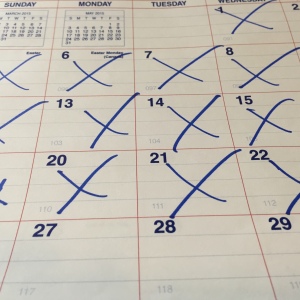Survivor. I have been reminded by a few folks that in just a week’s time, I will get to wear that moniker, when cancer treatments have ceased (with the exception of long-term drugs) and I can return to normal life. As normal as life is for anyone. It is a moniker I’m told I’ve earned and I should wear it with pride, knowing I’ve beaten the Cancer Beast.
But it is one I am uncomfortable with, and I’ll tell you why.
Generally speaking, cancer can be deadly. My experience with cancer, however, did not rise to life-threatening status. I was told from day one that my cancer was highly treatable and my prognosis excellent. I was told soon after that the genetic makeup of my tumor indicated a low likelihood of recurrence. Cancer wasn’t going to kill me this winter/spring—and maybe it won’t in the future. So, I don’t feel like I’ve done battle with a deadly foe.
The treatments I have gone through, although tedious and resulting in unpleasant side effects, have not entered the category of major adversity. Not to downplay the fatigue, soreness, and brain fog that have ensued, but I got pretty off easy. I never lost my appetite, lost my hair, couldn’t get out of bed, or cried in agony. I never faced a day where I thought, “I can’t endure this any more” but pushed on anyway. Again, not much of a fight on my end.
I know, cancer is cancer. It stinks no matter what the kind of cancer, what the type of treatment prescribed, and how long the course of treatment. It’s scary and disruptive and painful, emotionally and physically. And because it certainly can have dire consequences for some, I understand the need to give a major attaboy or attagirl to someone who’s lived through it and come out on the other side in relative good health.
But at the same time, why is cancer a sort of “king” of diseases? Why do we have a special, honored title for people who make it through cancer treatment but not for people who go through other diseases, whether acute or chronic?
What about other people with other diseases and conditions? Particularly those who don’t just have a season or a year of living with a disease, but year after year after year?
- The man with muscular dystrophy who faces the loss of physical abilities little by little—yet greets each day with determination and grace and even manages to go on a mission trip with his family? What do we call him?
- Or the woman who daily pricks her finger, adjusts her insulin pump, and tries not to worry about potential vision loss or nerve damage from a lifetime of diabetes—yet takes every healthy step she can to live a full life with her husband and kids? What’s the special name for her?
- The elderly parent who struggles with confusion and fear as he loses his faculties to Alzheimer’s Disease—yet still tries to interact with family members, friends, and nurses? What’s the badge of honor he wears?
- Or the girl with severe asthma who relies on inhalers and nebulizers to keep breathing—yet still signs up for the softball team, determined to play just like the other kids. Does she get a special title?
And then there are those who don’t survive cancer. What of the mom who pursues every treatment and fights ’til cancer steals her very last breath? Or the man who decides to forgo punishing chemo treatments to live out his days without the associated side effects, knowing that it means far fewer days? What do we call those folks?
I’m not in any way advocating for removing the term “survivor” from the cancer vernacular. And I certainly don’t mean to discount the term, criticize it, or imply that others should ever hesitate to call themselves that, proudly wear the word on T-shirts, and celebrate that title every second if they want to.
All I’m saying is that I am struggling with the label as applied to me and my circumstances. It is one of the many words, concepts, and experiences I have wrestled with—and continue to wrestle with—on this cancer journey.


